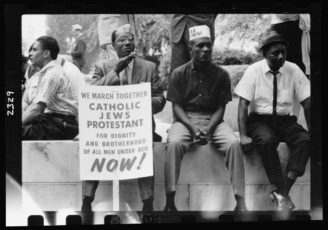1964
Civil Rights Movement
-
Early Years
- Post-Civil War Era in America
- A Prayer Circle
- Officers Elected
- Charter Granted
- General Convention Tables Resolution
- Matilda Hart Younkin Dies
- Golden Jubilee Convention Passes Resolution
- Homes Begin to Open
- Name Changes to NBA
- First Issue of “The Christian Philanthropist” Mailed
- J.H. Mohorter Elected General Secretary
-
Foundation
- NBA Homes Continue to Open
- R.A. Long’s $1 Million Challenge
- 100th Anniversary of Campbell’s Address
- World War I
- NBA Joins United Christian Missionary Society
- James Mohorter Dies
- The Great Depression
- Administration Returns to NBA
- Creation of “Family Talk” Magazine
- NBA Celebrates 50 Years
- World War II
-
Expansion
- Additional Properties Open
- Orval Peterson Serves as NBA President (1957-1971)
- National Housing Act Provides HUD Financing
- Home-service Program for Older Negro Disciples Initiated
- NBA Joins Unified Promotion
- Civil Rights Movement
- Disciples Adopt the “Provisional Design of the Christian Church (Disciples of Christ)”
- William Gibble Serves as NBA President (1971-1982)
- Notable Female Leadership Returns to NBA
- Richard Lance Serves as NBA President (1982-1996)
- NBA Dedicates New Beasley Office Building
- NBA Celebrates 100 Years
-
Transition
- From Orphanages to Treatment Centers and Community-Based Supports
- From Institutions to Community-Based Supports
- NBA’s Largest Retirement Communities Open
- NBA Leads the Church in Legacy Giving
- Cindy Dougherty Serves as NBA President (1996-2005)
- Miracle Days Begin
- NBA Helps Collect Racial/Ethnic Ministry Histories
- 9/11 Terrorist Attacks
- NBA Bankruptcy Proceedings Begin
- Dennis Hagemann Serves as NBA President & CEO (2005-2011)
- Blue Ribbon Panel Meets, Presents Findings
- Compassion and Care
- Home
- Library
- Memories
-


